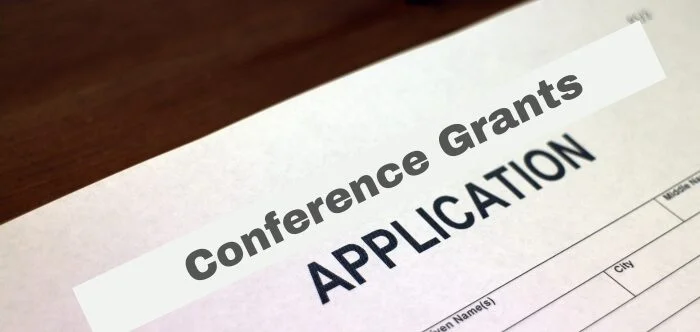Individuals who are willing to learn, develop, and network will find plenty of opportunities in the dynamic field of professional development. Conference grants are one such chance that goes unnoticed. But, “What is a Conference Grant?”
A conference grant is a type of funding provided to ease the financial burden associated with organizing or attending conferences, workshops, or seminars. It typically covers expenses like registration fees, travel, and accommodation. While eligibility varies, these grants are often available to academic institutions and non-profits.
If you’re curious about how conference grants can elevate your professional journey and expand your horizons, read on to explore the myriad benefits and opportunities they offer. Your next transformative experience might just be a conference grant away.
Do All Conferences Allow Grants?
No, not all conferences allow grants. While many conferences offer financial aid to help participants, others need to provide these resources. The availability of grant support for a conference depends on the organizer, purpose, and target audience of the event. Conferences focused on academia and non-profits are more likely to offer grants.
Conferences without grant support require attendees to bear all costs, making participation challenging for some. Therefore, checking if conference grant support is available before planning to attend is important. This information helps attendees budget and make decisions. Understanding the financial options can help you make informed choices about participating in conferences that align with your goals.
What is a Conference Grant?
A conference grant acts as a crucial financial support system for those wishing to attend professional gatherings. It assists with costs such as registration fees, travel expenses, and accommodation. This support ensures that participants can focus on learning and networking without the burden of high costs.
By covering essential expenses, these grants open doors for more individuals to attend key industry events. It also provides recipients with the opportunity to exchange knowledge and network professionally. Every grant represents an opportunity for professional growth and personal development.
The purpose of conference grant support is to make these enriching experiences more accessible to everyone. The system makes global dialogues and learning sessions accessible to a wide range of participants. Ultimately, these grants help create an inclusive environment where knowledge and opportunities are available to everyone.
Who Provides Conference Grants?
Conference grants can be invaluable for professionals looking to enhance their knowledge and networks, but knowing where to find them is crucial. Let’s explore the diverse sources that provide these grants.
Academic Institutions
Many universities and colleges offer conference grants to their students, faculty, and researchers. These grants are typically designed to support attendance at conferences relevant to their field of study or research. They may have specific departments or offices responsible for managing and disbursing these grants.
Nonprofit Organizations
Numerous nonprofit organizations, foundations, and associations offer conference grants to individuals or groups whose work aligns with their mission. These grants can help advance causes, share knowledge, and foster collaboration. Nonprofits often prioritize projects that have a positive social or environmental impact.
Government Agencies
Government departments and agencies often provide funding for professionals to attend conferences related to their area of expertise. These grants can be available at the local, state, or national level. Government-sponsored conference grants may have stricter application requirements and eligibility criteria.
Professional Associations
Members of professional associations may have access to conference grants as part of their membership benefits. These grants can facilitate networking and skill development within a specific industry or field. Associations often seek to support the professional growth of their members.
Corporate Sponsorship
Some companies sponsor employees to attend conferences, particularly if the event aligns with the company’s goals or the employee’s role. Corporate-sponsored conference grants can be an excellent way to invest in employee development. Companies benefit from employees’ increased knowledge and expanded networks.
Research Funding

Conference grants are available from different places like universities, nonprofits, government, professional groups, businesses, and research funders. To get one, match your needs with the right source and follow their application rules for career advancement.
Different Types of Conference Grants
As there are different types of conferences available, unlocking the full potential of conference grants involves recognizing the diverse range of options. These grants vary in focus and purpose, making it essential to understand the different types to better align your needs with the right funding opportunities.
Travel Grants
Travel grants are designed to alleviate the financial burden of getting to a conference. They cover expenses like airfare, train tickets, or gas mileage, as well as lodging costs. These grants are especially beneficial for individuals who may have limited resources for long-distance travel.
Registration Fee Grants
For those who have already arranged their travel and accommodation but need assistance with the conference registration fee, registration fee grants are the answer. These grants make it more affordable to gain access to the conference’s programs and activities.
Early Career Grants
Early career grants are tailored to professionals who are in the early stages of their careers. They often include mentorship opportunities and specialized sessions designed to support newcomers in their respective fields. These grants can help young professionals establish a solid foundation.
Research Presentation Grants
If you’re planning to present your research findings at a conference, research presentation grants can be invaluable. They cover expenses related to the preparation and delivery of your presentation, such as materials, poster printing, or equipment rentals. These grants are commonly found in academic and research-oriented conferences.
Diversity and Inclusion Grants
Many conferences are committed to promoting diversity and inclusion. Diversity and inclusion grants are aimed at supporting individuals from underrepresented groups, such as women, minorities, or people with disabilities. These grants help create a more inclusive and equitable conference environment.
Professional Development Grants
Professional development grants focus on enhancing your skills and knowledge in a specific field. They may cover costs associated with attending workshops, seminars, or training sessions, enabling you to expand your expertise and stay competitive in your industry.
Knowing the different conference grant types is vital. Whether you need help with travel, fees, mentoring, research, diversity, or skills, there’s a grant for you. Choose wisely to enhance your conference experience and achieve your goals.
How to Apply for Conference Grants?
Applying for conference grants can be a valuable way to secure the necessary funding to attend and present at important events. By following a structured approach, you can increase your chances of obtaining support. Here is a guide to help you apply for a grant for a conference you like to attend:
Step 1: Identify Potential Grants
Begin by researching available grants from professional organizations, universities, government agencies, and private foundations. Explore websites like Grants.gov for federal funding opportunities. Pay attention to grants that align with your field or focus area, as these are more likely to be a good match for your needs. Being thorough in your search will set a strong foundation for your application.
Step 2: Check Eligibility
Before applying, make sure you meet the eligibility requirements for the grant. This might involve membership in a specific organization, acceptance of your paper at the conference, or belonging to an underrepresented group. Carefully reviewing these criteria will save you time and effort. Only apply for grants where you are a strong candidate.
Step 3: Prepare Your Application
When preparing your application, you’ll need to gather several key documents. Include a personal statement explaining your conference goals and their potential impact on your career. Writing a motivation letter for a conference can be particularly influential, as it highlights your passion and relevance. Be sure to include your CV, research abstract, and a budget proposal that details your expected expenses. Gathering letters of recommendation from mentors can also strengthen your application.
Step 4: Submit Your Application
Follow the specific submission guidelines provided by the grant provider. Some may require online submissions, while others prefer email. Ensure all documents are properly formatted and submitted by the deadline. Double-checking your application will help avoid errors that could disqualify you.
Step 5: Follow Up
After submitting your application, monitor deadlines and be prepared to provide additional information if requested. Some grants may require an interview or further documentation. Staying organized will help you respond promptly to any follow-up requests. Keeping track of your application status is essential for success.
Conference Grant- How Does it Benefit You?
Conference grants are powerful tools that can significantly enhance your professional growth and networking opportunities. Here’s how they benefit you.
- Financial Assistance: Conference grants cover expenses like registration fees, travel, and accommodation, easing the financial burden of attending valuable events.
- Knowledge Expansion: They grant access to cutting-edge information, enabling you to stay updated on industry trends and emerging practices.
- Networking Opportunities: Conferences facilitate interactions with experts, peers, and potential collaborators, helping you expand your professional network.
- Skill Enhancement: Workshops and sessions at conferences provide opportunities for skill development and learning from industry leaders.
- Career Advancement: Presenting your research or expertise at conferences can boost your visibility and credibility in your field.
- Diverse Perspectives: Conferences expose you to diverse viewpoints and approaches, enriching your problem-solving abilities.
- Inspiration and Motivation: Attending conferences can reignite your passion for your field and inspire fresh ideas for your work.
Conference grants offer a gateway to a world of knowledge, networking, and personal growth that can significantly benefit your professional journey.
Key Strategies for Finding the Perfect Conference Grant
A strategic approach is necessary to maximize your chances of securing the best conference grant. By focusing on key areas, you can efficiently target opportunities that align with your goals. Here are some effective strategies to guide you in your search for the right grant.
Start with Specific Research
Focus your research on grants offered by organizations within your field. This targeted approach helps you find relevant opportunities. Exploring specialized grants increases your chances of finding support. Narrowing your search saves time and effort, making the process more efficient.
Align Grants with Your Conference Goals
Choose grants that match your specific conference objectives and career aspirations. For instance, consider the purpose of a student conference if you’re attending one. Ensuring alignment with your goals makes your application stronger. Tailoring your application to the grant’s purpose enhances your chances of success.
Network and Seek Recommendations
Networking with colleagues and mentors can lead to discovering grant opportunities. Recommendations from experienced professionals are invaluable. These connections might introduce you to grants you hadn’t considered. Leverage your network to uncover hidden funding opportunities.
Review Eligibility and Requirements Thoroughly
Carefully review the eligibility criteria and requirements before applying. Missing a critical detail can disqualify your application. Double-check that you meet all the necessary qualifications. Thorough preparation ensures your application meets the grant’s standards.
FAQs about What is a Conference Grant?
A conference grant is a form of financial assistance designed to help individuals attend and participate in conferences, workshops, or seminars. Below are five frequently asked questions about conference grants, along with concise answers to help clarify their purpose and process.
What Expenses Does a Conference Grant Typically Cover?
A conference grant usually covers expenses like registration fees, travel, and accommodation. The specific costs covered may vary depending on the grant provider. Some grants offer partial support, while others may fully cover your conference-related expenses.
Who is Eligible to Apply for a Conference Grant?
Eligibility for a conference grant often includes being a member of a professional organization or having an accepted paper at the conference. Grants may also target underrepresented groups or specific academic disciplines. Checking the specific criteria is crucial before applying.
How Do I Find Conference Grants to Apply For?
Conference grants can be found through professional organizations, universities, government agencies, and private foundations. Online resources like Grants.gov offer a searchable database for federal grants. Networking with colleagues and mentors can also help identify available grant opportunities.
What is Required to Apply for a Conference Grant?
Applying for a conference grant typically requires a personal statement, CV, research abstract (if applicable), budget proposal, and letters of recommendation. Each grant may have specific requirements, so it’s important to carefully review and follow the application guidelines provided by the grant provider.
How Long Does It Take to Receive a Conference Grant?
The time it takes to receive a conference grant varies by provider and the complexity of the application process. Some grants are awarded within a few weeks, while others may take several months. Following up on your application status can help you stay informed.
Conclusion
Conference grants are vital tools for professionals aiming to enhance their skills and network. They cover key costs like travel and registration, opening doors to invaluable learning and networking opportunities.
Being knowledgeable about “What is a Conference Grant?” is crucial for those eager to grow in their fields. These grants, accessible through diverse sources, ease the financial strain of attending conferences, enabling a broader exchange of ideas and experiences.
Successfully securing a conference grant involves careful research, tailored applications, and meeting deadlines. This strategic approach empowers individuals to fully exploit the benefits of these grants, leading to significant professional development and enriching interactions.







